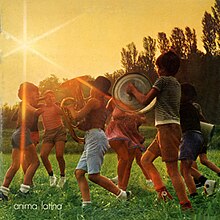Anima latina
| Anima latina | ||||
|---|---|---|---|---|
 | ||||
| Studio album by | ||||
| Released | December 1974 | |||
| Genre | Progressive rock, pop rock, psychedelic rock | |||
| Length | 47:59 | |||
| Label | Numero Uno | |||
| Producer | Lucio Battisti, Mogol | |||
| Lucio Battisti chronology | ||||
| ||||
| Review scores | |
|---|---|
| Source | Rating |
| Allmusic | |
| Ondarock | |
Anima latina (Latin soul) is an album by the Italian singer-songwriter Lucio Battisti. It was released in December 1974 by Numero Uno. The album was arranged and produced by the lyricist Mogol and Battisti in its entirety, with performances by various semi-unknown musicians. It is considered one of Battisti's masterpieces for signaling a significant departure from his previous records. Anima latina was Italy's eighth best-selling album of 1975.[4]
The album[edit]
Anima latina was meant by Battisti as an experiment, "the exact point of rupture between [his] yesterday and [his] tomorrow".[5] The album was conceived after a trip which Battisti took to South America and is particularly influenced by Brazilian music.
Charts[edit]
| Chart (2007–11) | Peak position |
|---|---|
| Italy (FIMI)[6] | 81 |
Track listing[edit]
All lyrics written by Mogol, all music composed by Battisti.
- "Abbracciala abbracciali abbracciati" (Embrace Her, Embrace Them, Embrace Yourself) – 7:04
- "Due mondi" (Two Worlds) – 5:13
- "Anonimo" (Anonymous) – 7:03
- "Gli uomini celesti" (The Celestial Men) – 5:06
- "Gli uomini celesti (ripresa)" (The Celestial Men (reprise)) – 0:52
- "Due mondi (ripresa)" (Two Worlds (reprise)) – 1:10
- "Anima latina" (Latin Soul) – 6:37
- "Il salame" (The Salami) – 3:38
- "La nuova America" (The New America) – 2:49
- "Macchina del tempo" (Time Machine) – 6:59
- "Separazione naturale" (Natural Separation) – 1:28
Personnel[edit]
- Alberto Radius - backing vocals
- Gianni Bogliano - trombone
- Lucio Battisti - arranger, theorbo, composer, guitar, keyboards, piano, primary artist, vocals
- Fabio Berruti - artwork, graphic design
- Piero Bravin - sound technician
- Pippo Colucci - trumpet
- Mara Cubeddu - vocals (on "Due mondi"), backing vocals
- Gianni Dall'Aglio - drums
- La Rosa, Antonio - remastering
- Massimo Luca - guitar
- Claudio Maioli - keyboards
- Mogol - composer
- Caesar Monti - photography
- Gigi Mucciolo - trumpet
- Dodo Nileb (Franco Loprevite) - percussion
- Claudio Pascoli - drums, flute
- Gneo Pompeo - strings, synthesizer
- Bob Wayne (Bob Callero) - bass, basso continuo
The name "Gneo Pompeo" (Italian for Gnaeus Pompeius) is a pseudonym and is widely believed[according to whom?] to stand for Gian Piero Reverberi. It has also been claimed[citation needed] that it stands for Gabriele Lorenzi.
References[edit]
- ^ "Anima Latina". Allmusic. Retrieved 25 July 2012.
- ^ Francesco Buffoli. "Lucio Battisti. Un'emozione italiana" (in Italian). Ondarock. Archived from the original on 10 February 2010. Retrieved 25 July 2012.
- ^ Salvatore Setola. "Lucio Battisti - Anima latina" (in Italian). Ondarock. Retrieved 25 July 2012.
- ^ "Classifica degli album più venduti del 1975" (in Italian). www.hitparadeitalia.it. Retrieved 18 August 2009.
- ^ (in Italian) Rolling Stone Italia, No. 93, pp. 77-81
- ^ "Italian Charts".
External links[edit]
- Lucio Battisti, Anima Latina at www.allmusic.com

